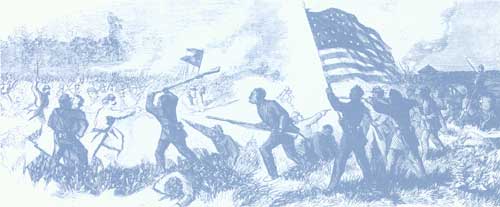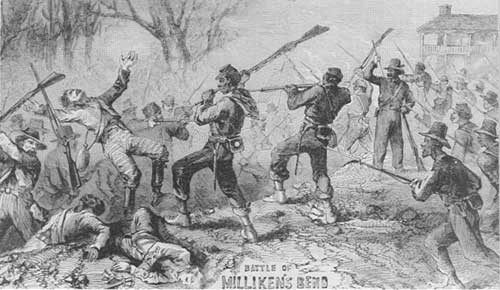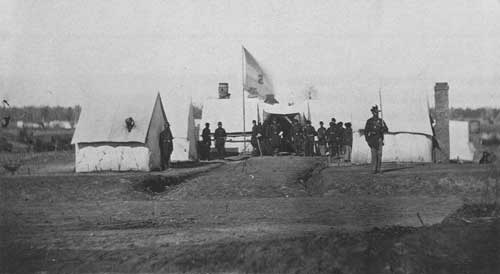|
MILLIKEN'S BEND
Barely ten days after the fight at Port Hudson, black troops were
again thrust into battle. The fight took place along the Mississippi
River, this time at a place called Milliken's Bend. Five thousand troops
were sent to crush the new black regiments that were forming there and
disrupt Union efforts to capture Vicksburg and Port Hudson.
To counteract the Rebel advance, the commanding officer at Milliken's
Bend, Colonel Herman Lieb had a gun boat, four understrength black
regiments with only a few days of training and antiquated Belgian
muskets, and two understrength companies from the 23rd Iowa Infantry,
some thousand men in all. The gunboat provided the artillery
support.

|
BLACK TROOPS BATTLE WITH CONFEDERATES AT MILLIKEN'S BEND. (FW)
|
Fortunately for Lieb, the terrain provided some compensation for his
command's inadequate size and lack of experience. Because the water
level on the Mississippi River was low, the riverbank was serviceable as natural
earthworks for the Federals. A flat, open area, some 150 yards in length
and one-quarter of a mile in width, extended beyond that. Black
soldiers had established their camp there. At the western border of this
area was a six-foot-high levee. Because of his manpower shortage,
Lieb's left flank was open, but another cross levee and the hedges
channeled attackers into an open field where the defenders had a clear shot
at them.
On June 6, Lieb skirmished with some Confederates and fell back to
camp. Immediately, he doubled the pickets and placed some mounted
soldiers well outside the line for early warning. He directed the
remaining troops to take positions behind the levee. On the extreme left
was the 9th Louisiana Infantry (5th U.S. Colored Heavy Artillery), and
next to it was the 1st Mississippi Infantry (51st U.S. Colored
Infantry). In the center Lieb placed the 13th Louisiana Infantry (63rd
U.S. Colored Infantry) and the 23rd Iowa, and on the far right he
positioned the 11th Louisiana Infantry (49th U.S. Colored Infantry).
A brigade of Confederates, 1,500 strong under Brigadier General Henry
F. McCulloch, pursued the retreating Federals vigorously and began
driving in the pickets before 4 A.M. McCulloch quickly deployed his
column some three-quarters of a mile from the Federal line and
struck with a vengeance. "No quarters for
white officers," shouted Rebel troops, "kill the damned
Abolitionists, but spare the niggers." During the course of the battle
they executed at least two white officers.

|
THIS WARTIME SKETCH SHOWS THE INTENSE HAND-TO-HAND COMBAT
AT MILLIKEN'S BEND. (FW)
|
Resisting the impulse to shoot too soon, the defenders held fire
until the Confederates were two hundred yards away. Despite their
inadequate training with firearms, rounds crashed through the Rebel
ranks. For a moment, the volley stunned the attackers, but the
Confederate troops regained their momentum. Onward they pressed.
For the next few minutes soldiers
battled hand-to-hand. Men clubbed, slugged, wrestled, and jabbed at
their enemy with muskets and bayonets.
|
Courage could not compensate for inexperience among the black
Federals. Under the enormous stress of the assault, untrained black
soldiers were unable to reload rapidly enough. Through gaps in the
hedges screaming Rebels poured, assailing the Union troops behind the
levee. Since most Confederates had not fired their weapons, they
discharged as they came over the top. For the next few minutes soldiers
battled hand-to-hand. Men clubbed, slugged, wrestled, and jabbed at
their enemy with muskets and bayonets. "It was a horrible fight,"
insisted a white captain of black soldiers, "the worst I was ever
engaged in, not even excepting Shiloh." He personally suffered two
bayonet wounds, and his men "met death coolly, bravely; not rashly did
they expose themselves, but all were steady and obedient to orders."
Lieb had withheld two understrength companies in reserve. Now they
joined the melee. Their commander knew that these were green troops, and
they would most likely shoot high in the excitement. He ordered his men
to fire only if the muzzle touched a Confederate. For these untrained
men, the bayonet would serve as their primary weapon. Once Lieb
unleashed them, they struck with a fury, reviving their embattled
comrades.
For a few moments it seemed that the Federals might hold. Then just
as suddenly the tide shifted when the
Confederates seized a position on the extreme left portion of the
levee and poured a murderous enfilading fire down the line. This
stampeded the two companies of Iowans from the field. As Confederate
General McCulloch described it, "the white or true Yankee portion ran
like whipped curs almost as soon as the charge was ordered," while the
black soldiers resisted with "considerable obstinacy." Nonetheless, the
black soldiers buckled under the weight of the Confederate onslaught.
Outflanked, nearly all the Federals abandoned the levee for the
riverbank. Only the men on the extreme right behind the old cross levee
and cotton bales managed to repel the assaults.
Several times the Confederate officers hurled their men forward,
hoping to drive the black troops into the river. But they never gained a
toehold on the river bank. After a long march, an early morning
advance, and several hours of vicious fighting, exhaustion set in. For
the remainder of the day, they were unable to mount an effective charge.
"Those negro bayonets," crowed a Union officer, "had got on to their
nerves."
When the attack lost its momentum, McCulloch requested
reinforcements to continue the fight, but they never arrived. Stung by
unanticipated Federal resistance, and unable to advance in force after
several hours of work, the Confederate commander decided to withdraw.
The Battle of Milliken's Bend, one of the most desperate in the entire war, had
ended.

|
HEADQUARTERS OF THE SECOND BRIGADE, EIGHTH CORPS
D'AFRIQUE. THIS REGIMENT FOUGHT AT LAKE PROVIDENCE,
LOUISIANA. (MH)
|
Casualties in the fight were staggering. McCulloch's force suffered
44 killed and 131 wounded. For the Federals, losses were horrendous.
When Acting Rear Admiral David Dixon Porter arrived on the scene a few
hours after the battle had ended, he could not help noticing that "the
dead negroes lined the ditch inside of the parapet, or levee, and most
were shot on the top of the head." Among the black troops, 35 percent of
those in the fight were killed or wounded. Well over two hundred more
were missing, although Lieb believed that many of those troops wandered
off sometime after the battle and were not present at roll call. In the
9th Louisiana Infantry, nearly 45 per cent of its men were killed or
mortally wounded. That was the highest proportion of killed and mortally
wounded in a single battle throughout the entire war, nearly 17 percent
higher than that of the next nearest regiment, the 1st Minnesota
Infantry at Gettysburg.
Troops from only one black regiment acted badly, and that was
because their commander and several other officers removed themselves
from the view of their men. When the troops saw no officers, they felt
deserted and some abandoned their posts. Otherwise, these black troops
exhibited extraordinary valor, refusing to leave their comrades. "Many
of the severely wounded voluntarily returned to the ranks after washing
their wounds," noted the commander of the 1st Mississippi Infantry.
The performance of the black troops impressed
everyone who witnessed the battle or examined its
aftermath.
|
The performance of the black troops impressed everyone who witnessed
the battle or examined its aftermath. "I never more wish to hear the
expression, 'The niggers wont fight,'" insisted a captain in the
engagement. Another captain of white troops who observed the black
soldiers in action that day announced to Major General Ulysses S. Grant,
"The capacity of the negro to defend his liberty, and his susceptibility
to appreciate the power of motives in the place of the last, have been
put to the test under our observation as to be beyond further doubt."
And Charles A. Dana, a noted journalist and Secretary of War Edwin M.
Stanton's emissary and investigator, gleefully pronounced the
experiment of black soldiers a success. "The sentiment in regard to the
employment of negro troops has been revolutionized by the bravery of the
blacks in the recent battle of Milliken's Bend," Dana reported to
Stanton. "Prominent officers, who used in private to sneer at the idea,
are now heartily in favor of it."
|
|
